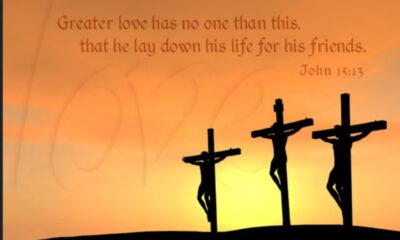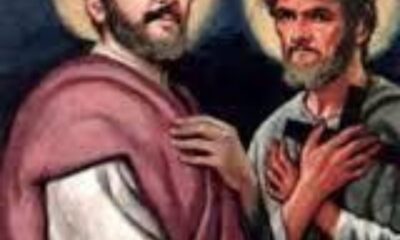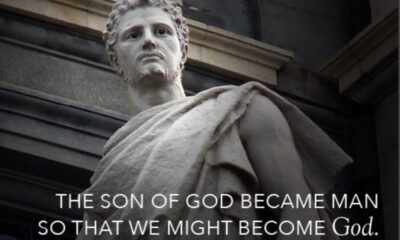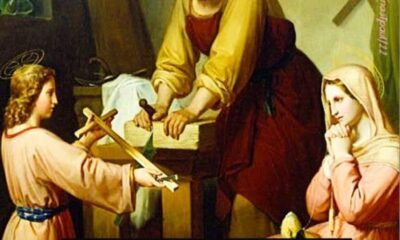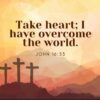Follow Me !
Fifth Sunday in Ordinary Time (Year C)
Isa 6.1-8; Ps 137; II Cor 15.1-11; Lk 5.1-11
“Here I am: send me”-Isaiah 6:8
“They left everything and followed Him.”- Luke 5 :11
LUKE’S ACCOUNT ON THE CALLING OF THE FIRST DISCIPLES
In today’s gospel reading, Saint Luke gives his account of the calling of the disciples. It happens suddenly, almost without warning. Our Lord commandeers a fishing boat so that he can speak to the crowd from just offshore. Saint Luke gives the impression that the boat just happens to belong to Simon – but there is deliberate purpose in Our Lord’s choice.
OUR LORD’S CHOICE
When He chose Simon’s boat, Our Lord was also choosing Simon and his friends, James and John. They had already heard of Jesus and Simon had met Him and seen his wonderful power to heal. Something about Our Lord impelled these three men to respond to his request for the use of the boat, to obey his instruction and to pay out their nets. They are rewarded by an outstanding catch of fish.
SIMON’S RESPONSE
It is at this point that Simon acknowledges Jesus. Having seen his mother in law healed and the boat overwhelmed with fish after a fruitless day’s work, Simon makes his confession of faith: “Leave me, Lord, I am a sinful man.” Without any formal invitation, Our Lord simply makes a statement “From now on you will be fishers of men.” These words produce a response. Bringing their boats back to land, they left everything and followed Him.
THE LORD CHOOSES
This calling of the first disciples is surprisingly low-key – there are no solemn statements, formal invitations or prayer. There is a personal encounter between three men and the Son of God in the context of their work. However, the first disciples were not called by chance or accident. Our Lord knows them. He has assessed them. He trusts them. He creates a moment of opportunity and they respond.
THE OPPORTUNITY GIVEN
Perhaps you can remember a moment when someone offered you an amazing opportunity? A new experience, a challenge, a break out from constraints? How did you respond? Perhaps a majority of us here at Mass have had such an opportunity or challenge. Many of us will have let the moment pass and seen life return swiftly to its old routine. That moment becomes an occasional memory, perhaps a source of regret that we lacked the courage to seize or do whatever was on offer.
DAILY RESPONSE
Vocation – a call from God – is something like this. Those of us who have been Baptised are living out our Christian vocation by our presence. Those of you here who are not Catholics may be responding to an inner prompting of enquiry, an interest in becoming members of the Catholic Church. Our sense of vocation is ongoing, in the sense that each Sunday and Holy Day, and perhaps on weekdays too, we feel an inner prompting to come to Mass. We are invited to pray, to receive Absolution. We can respond – or let the moment pass. We share much in common with Simon, James and John, called in the midst of their work without any great fuss. But we face real choices.
MOMENT OF VOCATION
The first and second readings remind us that vocation can be more dramatic. Isaiah found himself transported in a vision when the Temple and heaven became one place. God appeared to Isaiah in a blaze of glory, the Temple filled with smoke and a seraph touched his lips with burning coal. God spoke to Isaiah, asking “Whom shall I send?” Isaiah answered the call. There could be no more awesome moment of vocation. Saint Paul was called into the service of the Church by being struck blind and recovering his sight. His moment of vocation was surely one of panic and terror at the loss of his sight. His commitment to Christ, perhaps the most dramatic conversion in the history of the Church, was born of a desperate personal experience.
BASIC REQUIREMENT:
FAITHFULNESS
We are all here through the vocation to enter ever more fully into the life of Christ and the Catholic Church. Living out this vocation requires our faithfulness to the teachings of the Church – as Saint Paul puts in the First Letter to the Corinthians, “the gospel will save you only if you keep believing exactly what I preached to you.” We could say that our vocation is to stay “on message”. It is also true that each and any of us may have a particular vocation which we are already living or have yet to discover: mission, service to the sick or the poor, evangelism, teaching, the religious life; and for the men present, diaconate, priesthood – or even the episcopate! We may discern this particular vocation over a long period – like the dripping of a tap or a gentle voice whispered into our consciousness over a period of time. Or we may be confronted by God. He could call us in the midst of everyday life, as Jesus called Simon Peter. Or He may withdraw us to an extraordinary experience of His presence like that experienced by Isaiah.
OPENESS AND AVAILABILITY
Living our fundamental Catholic vocation requires us to be open and alert. We are all called to be “on message”, faithful in our reception of the Sacraments, prayerful and evangelistic. This may be our Catholic vocation in its totality. However, any of us could be called to serve God in a particular way at any time. Finding our true happiness and fulfilment will be dependent on our discernment and acceptance of this call. Our true vocation already exists in the mind of God. He will never ask us to do anything beyond our ability, though he will rarely leave us to do only what is easy.
AUTHENTIC WITNESSiNG
The saints of the Church show us the diversity of vocation. Heroic witness in martyrdom was witnessed in the early centuries of the Church’s life and in penal times in our own land the Forty Martyrs trod the same path. Saint Francis with his preaching and Saint Clare with her prayer contributed to a century of evangelical poverty. Active love of neighbour in streets and remote places sits beside Saint Therese’s discovery, enclosed in her Carmel in weakness and sickness, that her vocation of love bound her to the need in prayer. Equally, the great Christian witnesses in our own lifetime have been called to a wide range of lifestyles and activities.
TWO SENSES OF VOCATION
The Church understands vocation to have two aspects: the individual’s sense of being called and the Church’s recognition of that calling. Catholicism is not a religion of freelances. If we feel called to a ministry, the Church will test our vocation and, if it approves, prepare us to exercise the role to which we have been called. Sometimes God will call us through a word from someone in the Church, through a vocations day, through our observation of dedicated Catholics whose lives make an impact on us. At other times, the prompting may be an inner voice in our hearts, or a voice spoken in a quite unexpected – maybe even a non-Catholic context.
JESUS IS CALLING YOU TODAY
Today, then, as we reflect on Isaiah and Saint Paul in their moments of dramatic vocation, and the first three disciples called in the midst of their work, we must ask God for the gift of discernment. In this Mass, let us become more conscious of the continuing Catholic vocation we all share. But also be aware that the Church needs priests; that Catholic schools need Catholic teachers; that needy souls need help in times of marital breakdown, family crisis, poverty and sin from volunteers and professionals. God may be speaking to you today or in the near future. If your life feels incomplete or unfulfilled, or perhaps too cosy and tranquil, ask whether God is, or may soon, pose you a question. Perhaps He has a challenge, or may offer you an opportunity to do something different with your life for Our Lord and His Church. THE CHOICE IS YOURS.
May we receive the grace to know our calling from God and to follow it with faith and love. Amen.
Joe


